Nvidia says it has shipped twice as many 50-series GPUs as 40-series since launch, but it's a misleading comparison
The problem is the first five weeks of Ada only had RTX 4090 cards available.
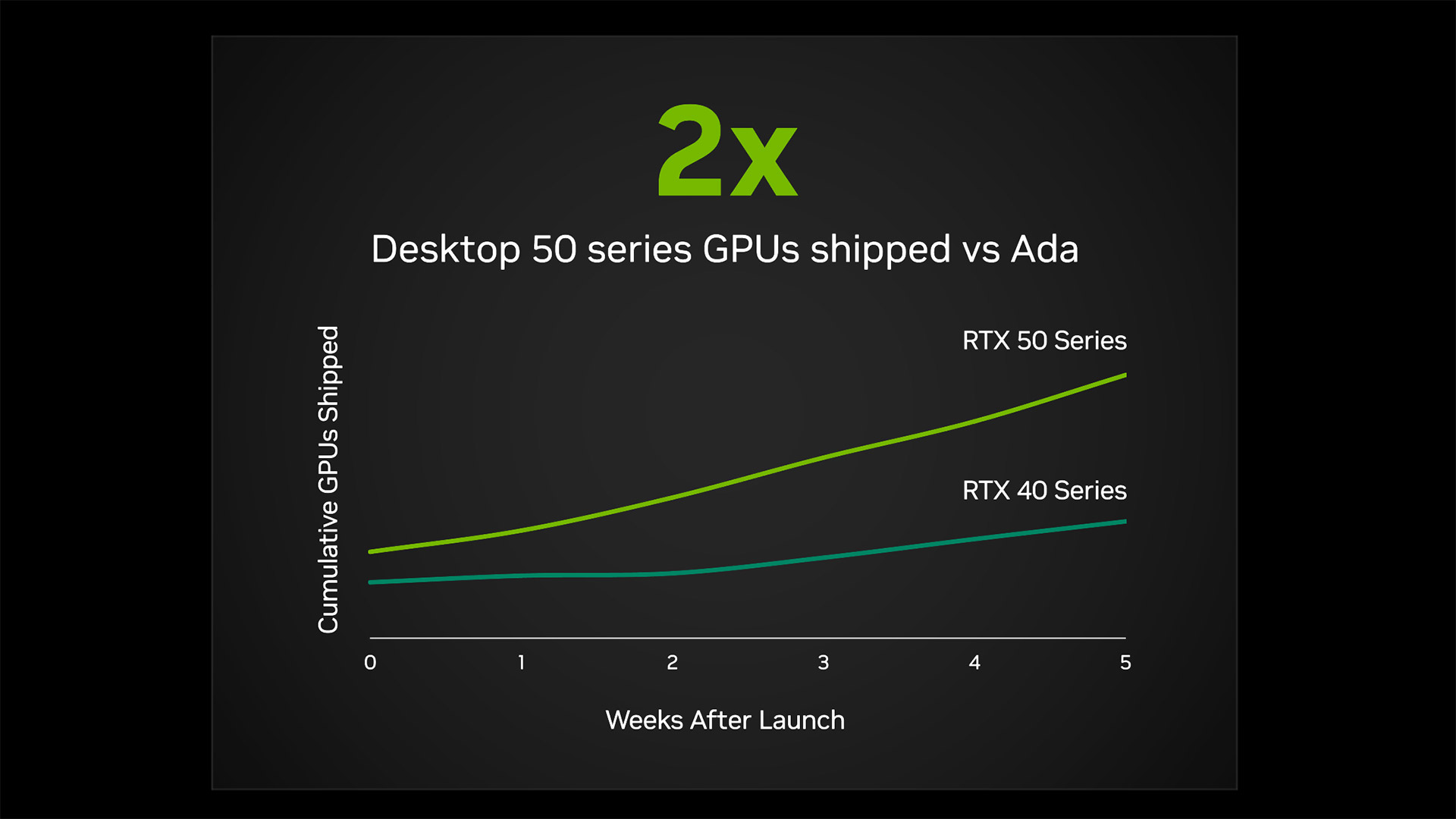
It's been a very busy year so far for GPUs, with Nvidia launching the RTX 5090, RTX 5080, RTX 5070 Ti, and RTX 5070 in the span of just two months. AMD also launched its RX 9070 XT and RX 9070, while Intel released the Arc B580 late last year and the Arc B570 in mid-January. The only problem? Outside of the Arc B570 (kind of but not really), every GPU launched so far has ended up being sold out or severely overpriced. But have no fear, because Nvidia claims it has shipped twice as many Blackwell GPUs as Ada during the first five weeks of each product series. Except that comparison is questionable, at best.
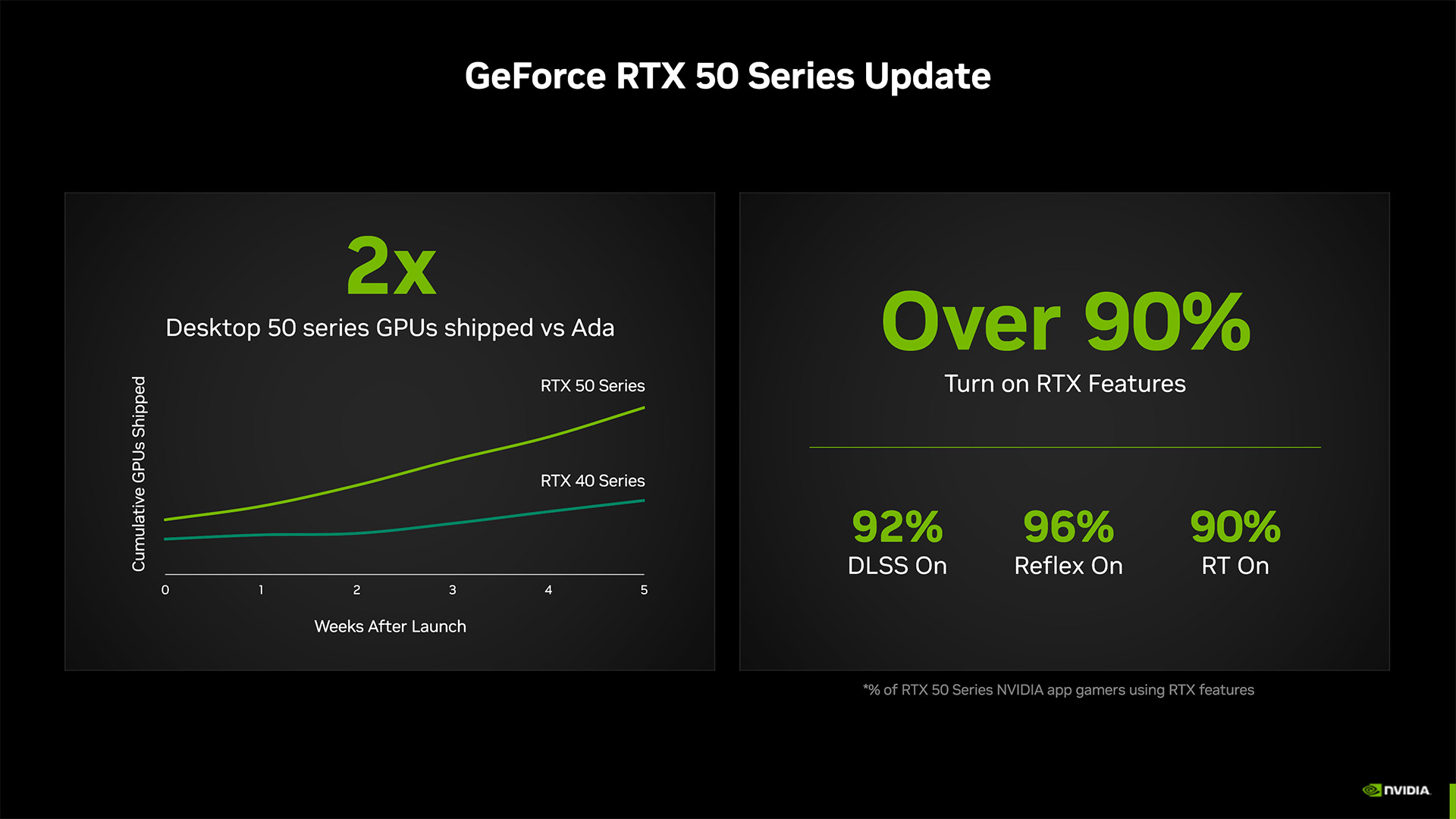
The above chart looks pretty good, right? And then you go check the data and discover that the RTX 4090 launched on October 12, 2022, and was the only Ada GPU for the first five weeks — the RTX 4080 arrived on November 16, 2022, exactly five weeks and one day later. By comparison, the RTX 5090 and RTX 5080 both launched on January 30, 2025; the RTX 5070 Ti arrived on February 20; and the RTX 5070 just came out on March 5. So, in the first five weeks, Nvidia appears to be comparing the sole halo card from its Ada Lovelace and RTX 40-series GPUs to the first four Blackwell and RTX 50-series GPUs — or at least, that's how we read it. Maybe the launch supply of the 4080 was also factored in.
If we were to get a more direct comparison, we'd need to look at the first five weeks of the 4090 and 4080, plus the first two weeks of the 4070 Ti, plus the first day of the 4070. We think it's a safe bet that all those added together would easily eclipse the number of RTX 50-series GPUs shipped so far. Even at the most simplistic level, Blackwell had two GPUs (5090 and 5080) launch on the same day compared to one GPU for Ada (4090), so shipping twice as many would be the baseline.
This was a 'great' way to obfuscate the number of units shipped and claim to have shipped more inventory than in the past. It also completely neglects the fact that RTX 30-series GPUs were still relatively available right up to the launch of the 40-series, while the 40-series cards have been disappearing from shelves since last fall. We're told that more RTX 50-series GPUs are being produced, and Nvidia and its add-in board (AIB) partners are making them as fast as possible, but concrete numbers are not something anyone is willing to disclose.
However you want to slice it, Nvidia's latest GPUs are hard to come by. The current lowest prices online have just one RTX 5070 for $739 at Newegg, with third-party scalpers listing RTX 5070 cards at Amazon for $900 or more. RTX 5070 Ti starts at $1,149, the 5080 costs $1,609 or more, and the RTX 5090... you don't even want to know. (None are listed at PC Part Picker, but on eBay during the past 30 days the average sold 5090 at auction cost nearly $4,500, with 194 units sold.) AMD's RX 9070 series GPUs aren't doing much better, with an $853 RX 9070 on Amazon and a $939 RX 9070 XT also at Amazon. It could be a long wait for supply to catch up to demand, needless to say.
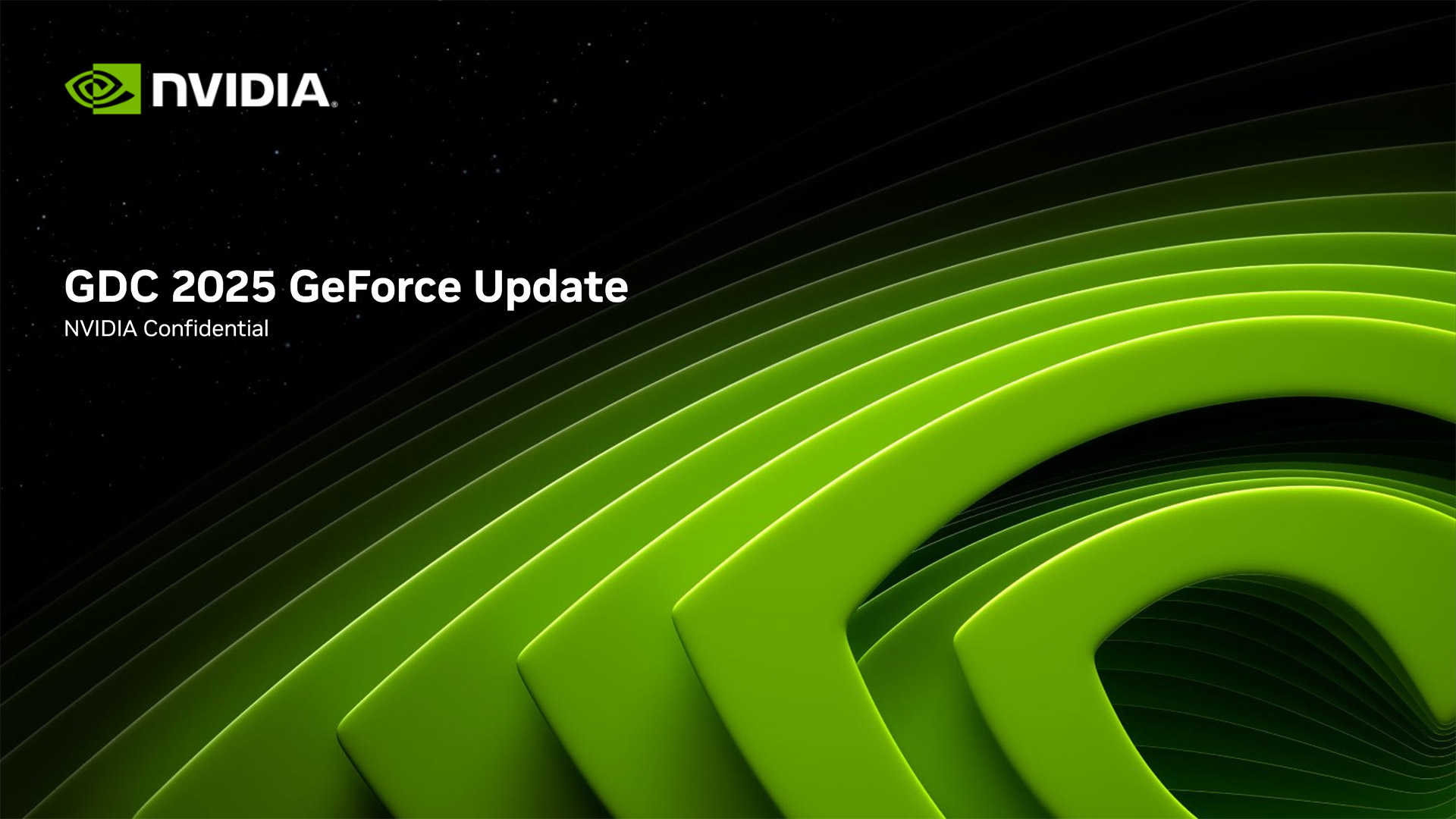

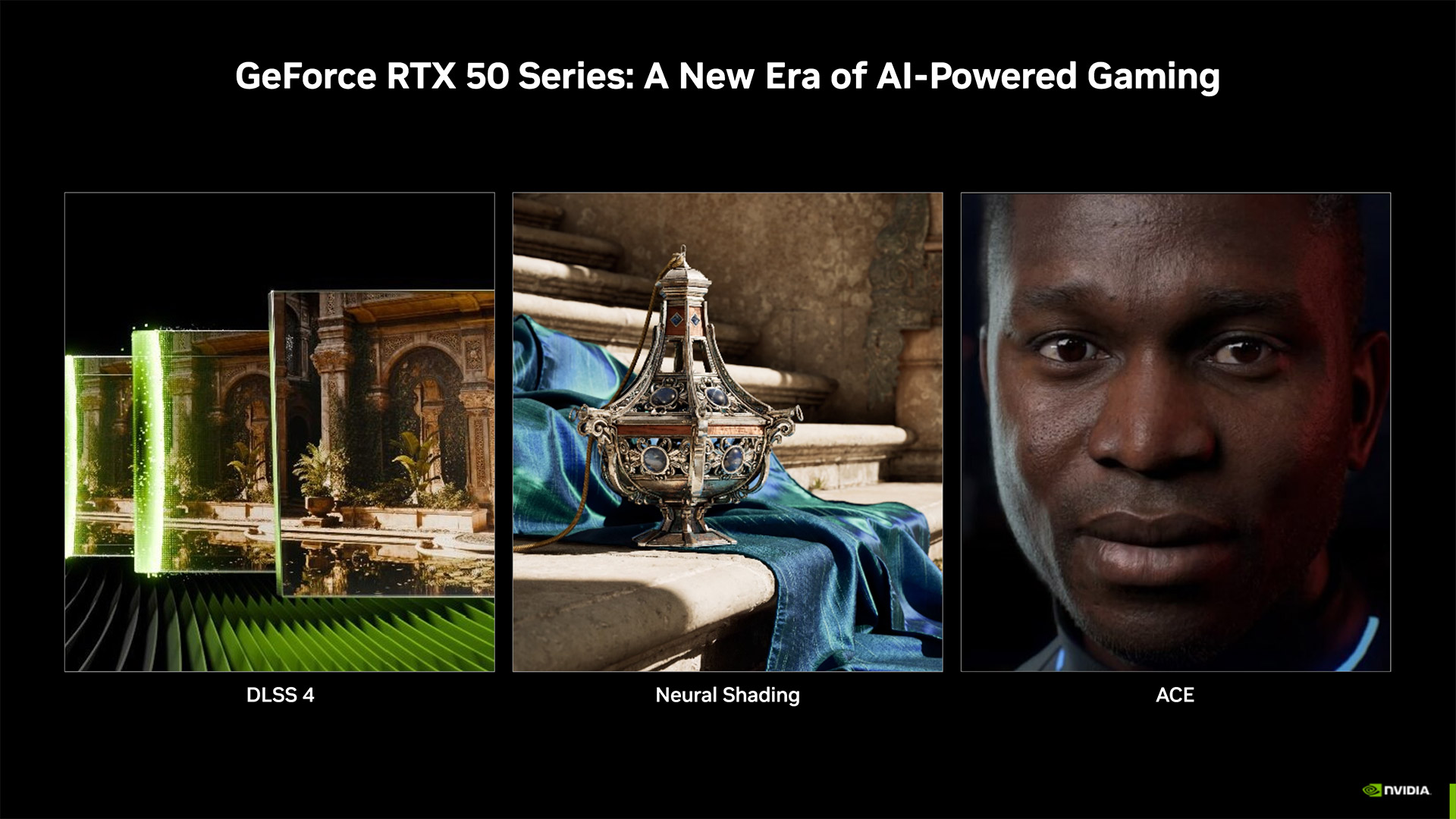
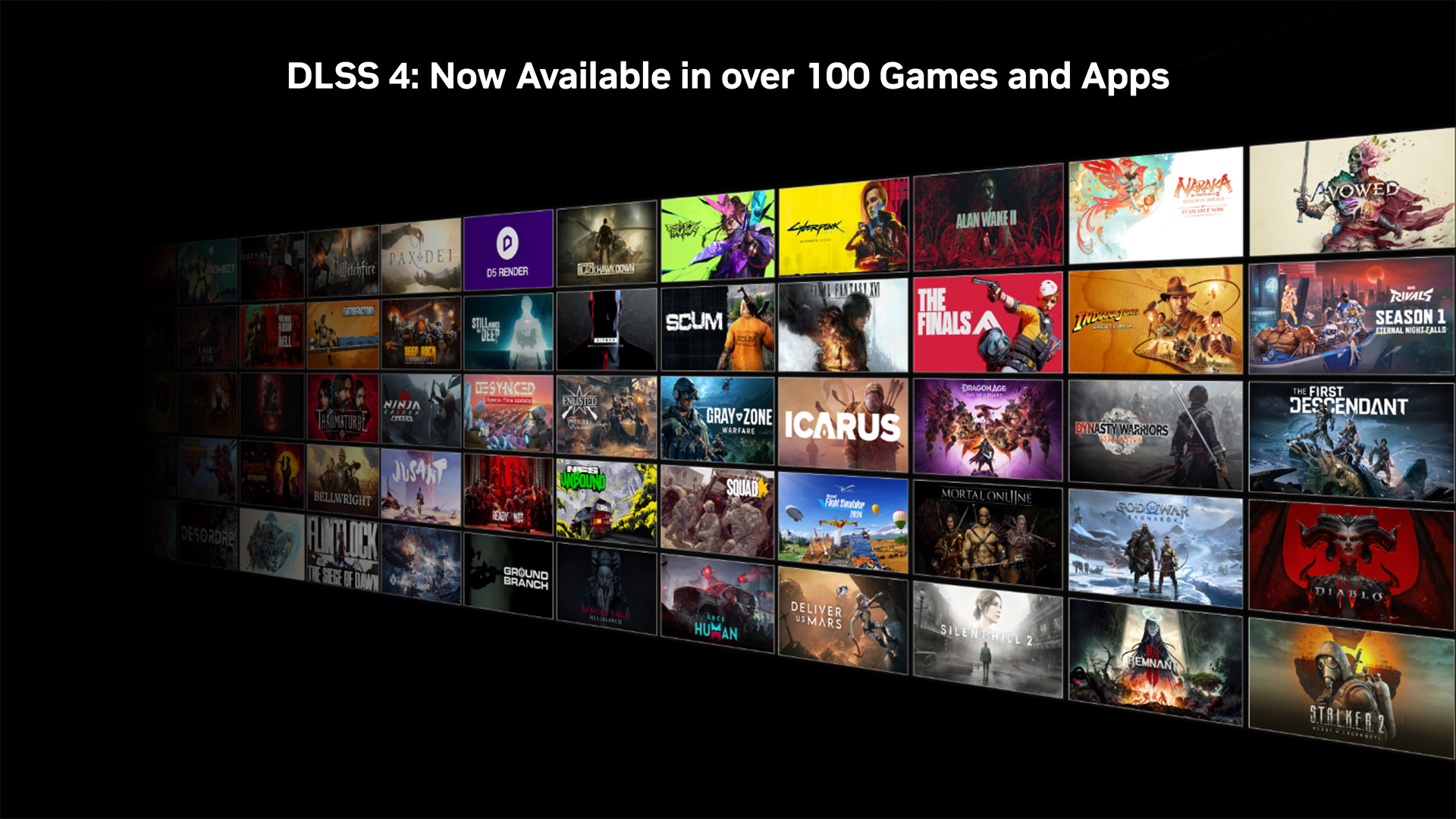

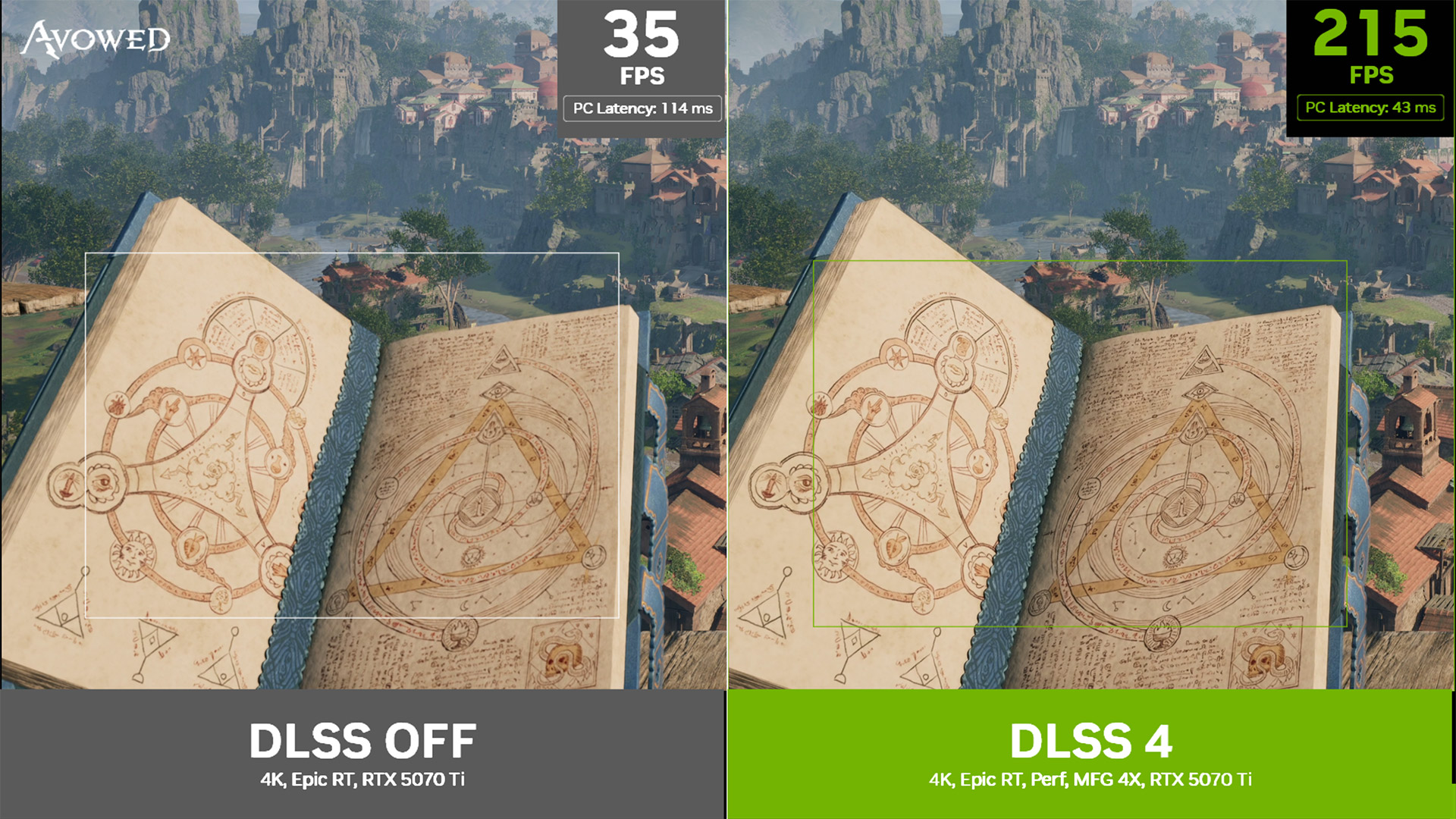
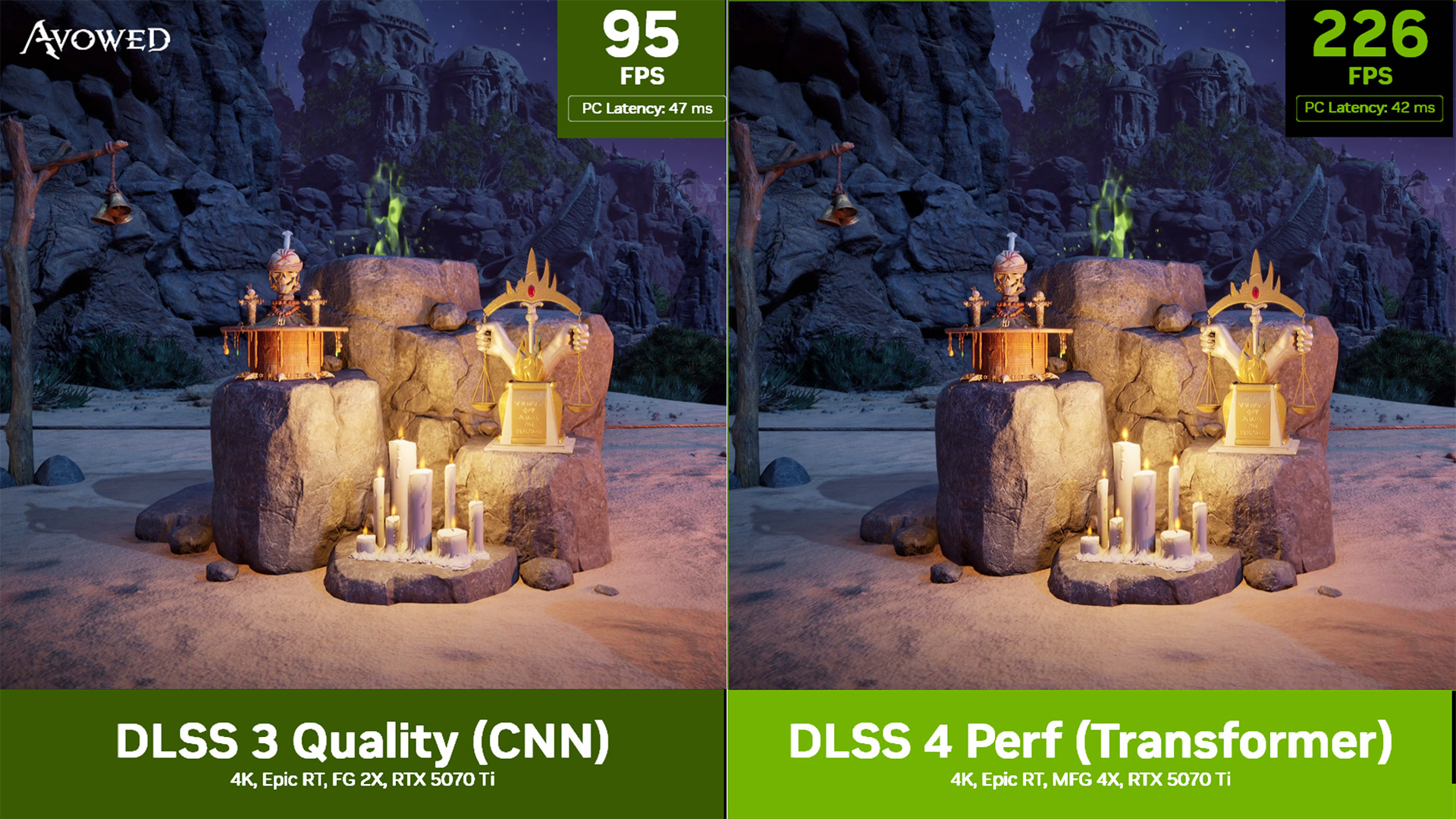
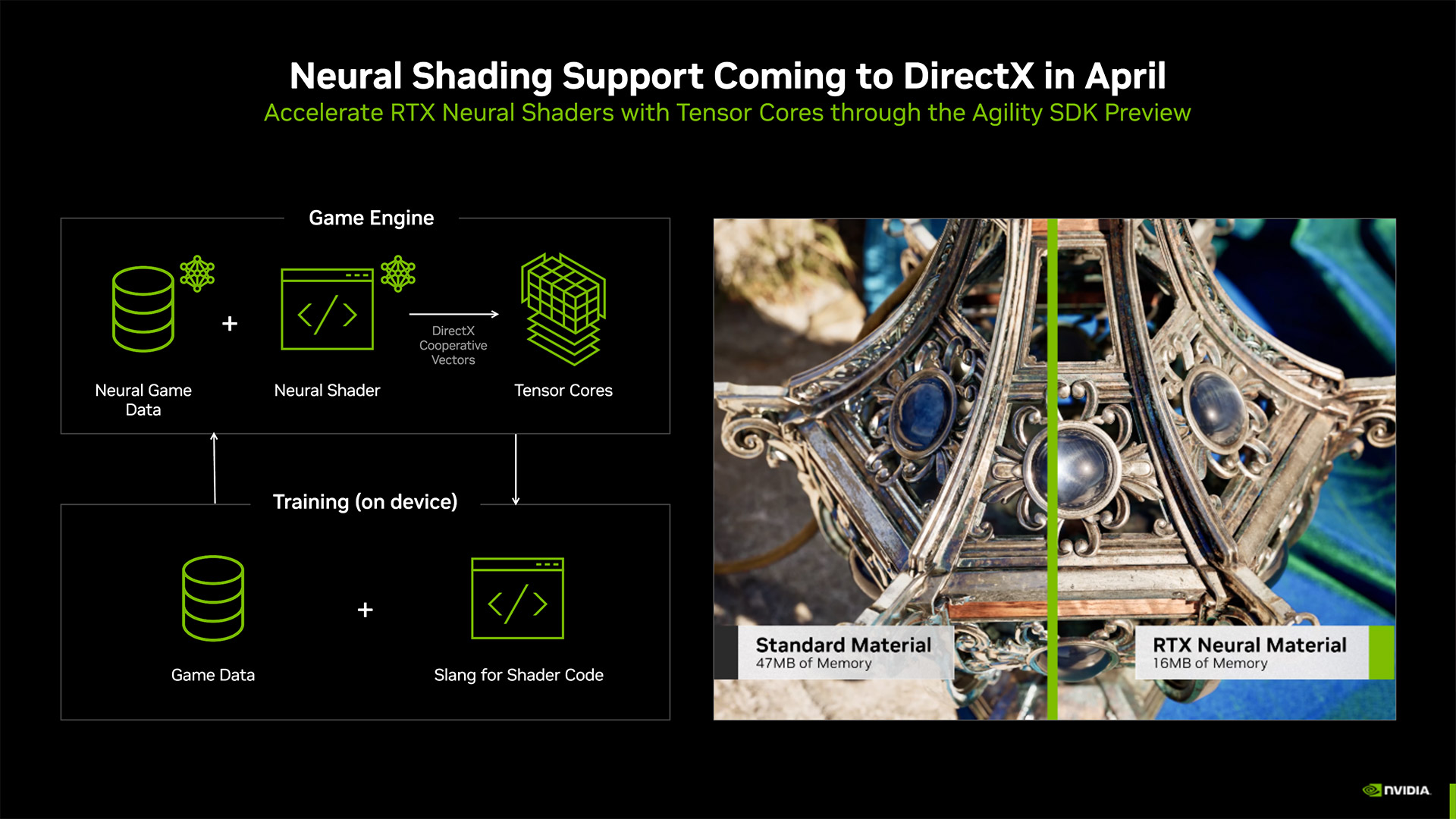
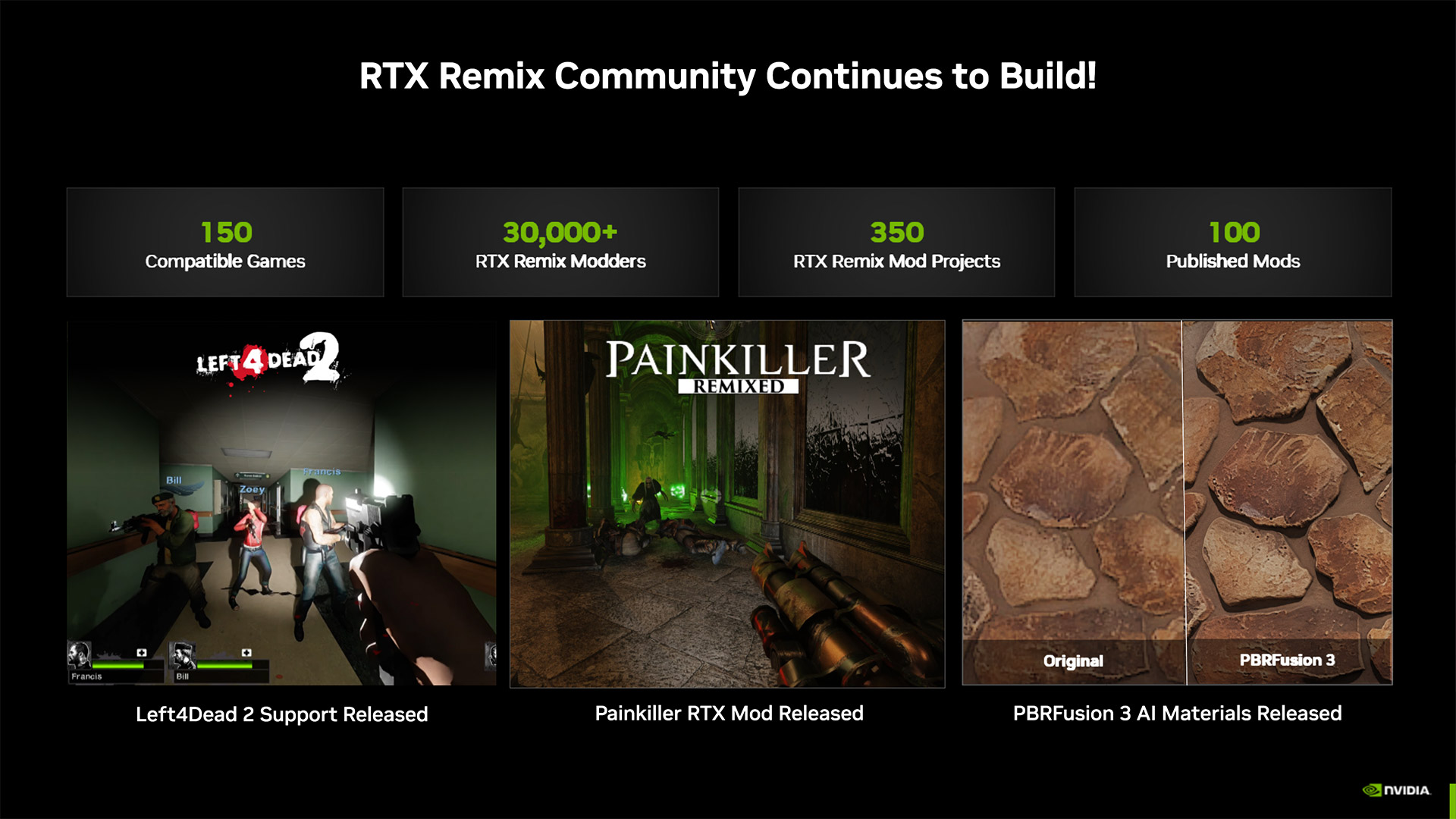
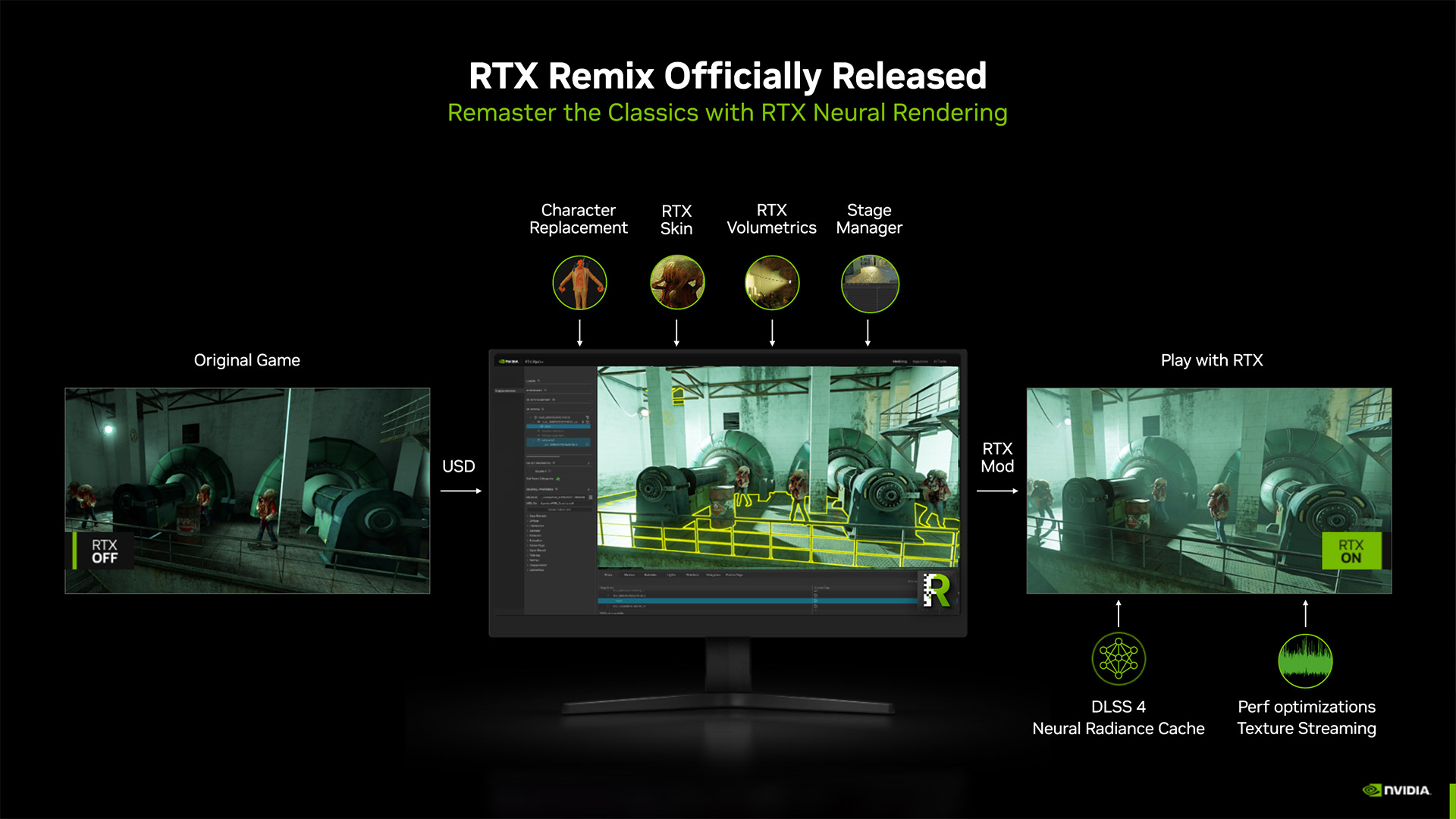
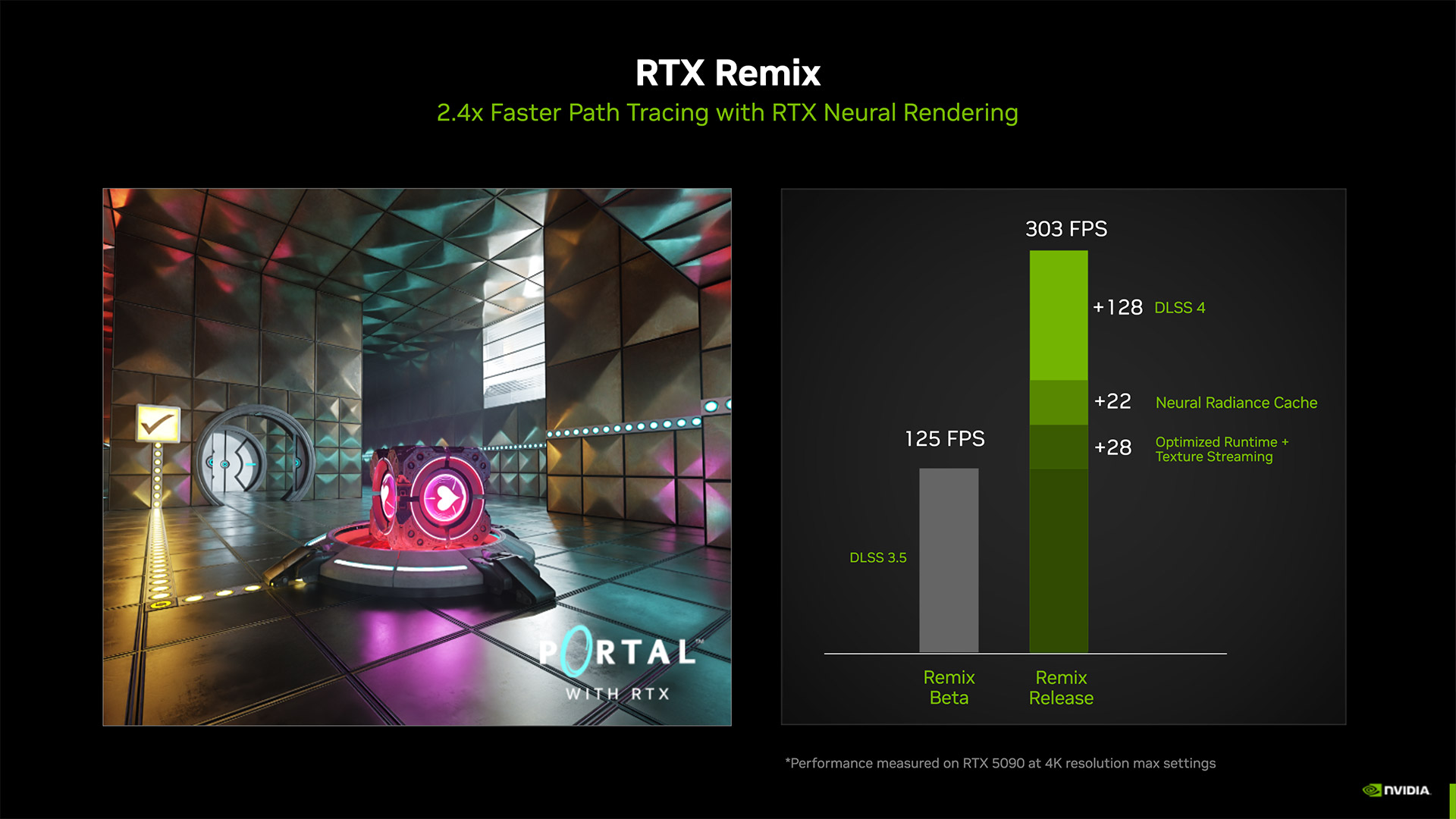
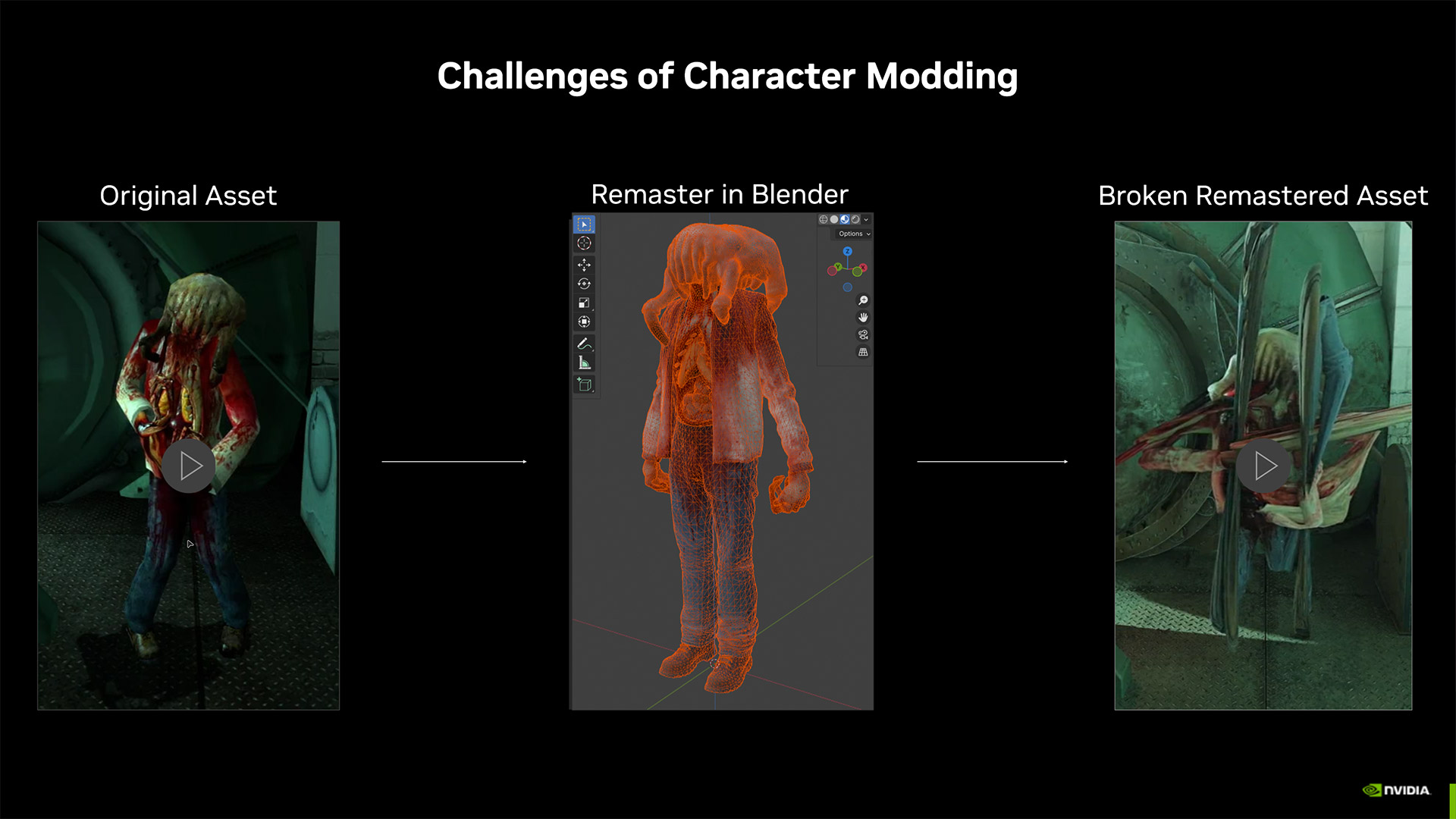
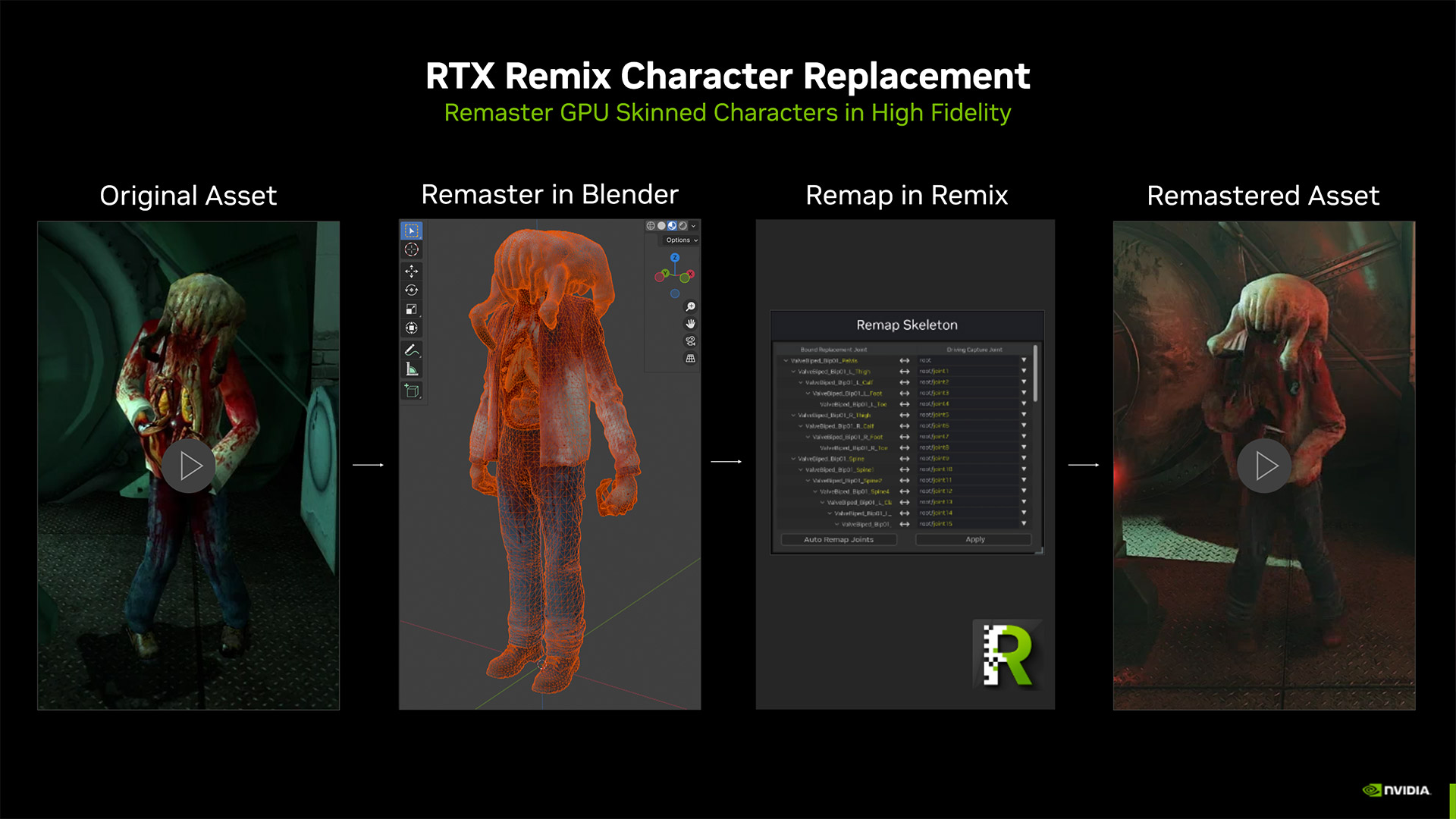
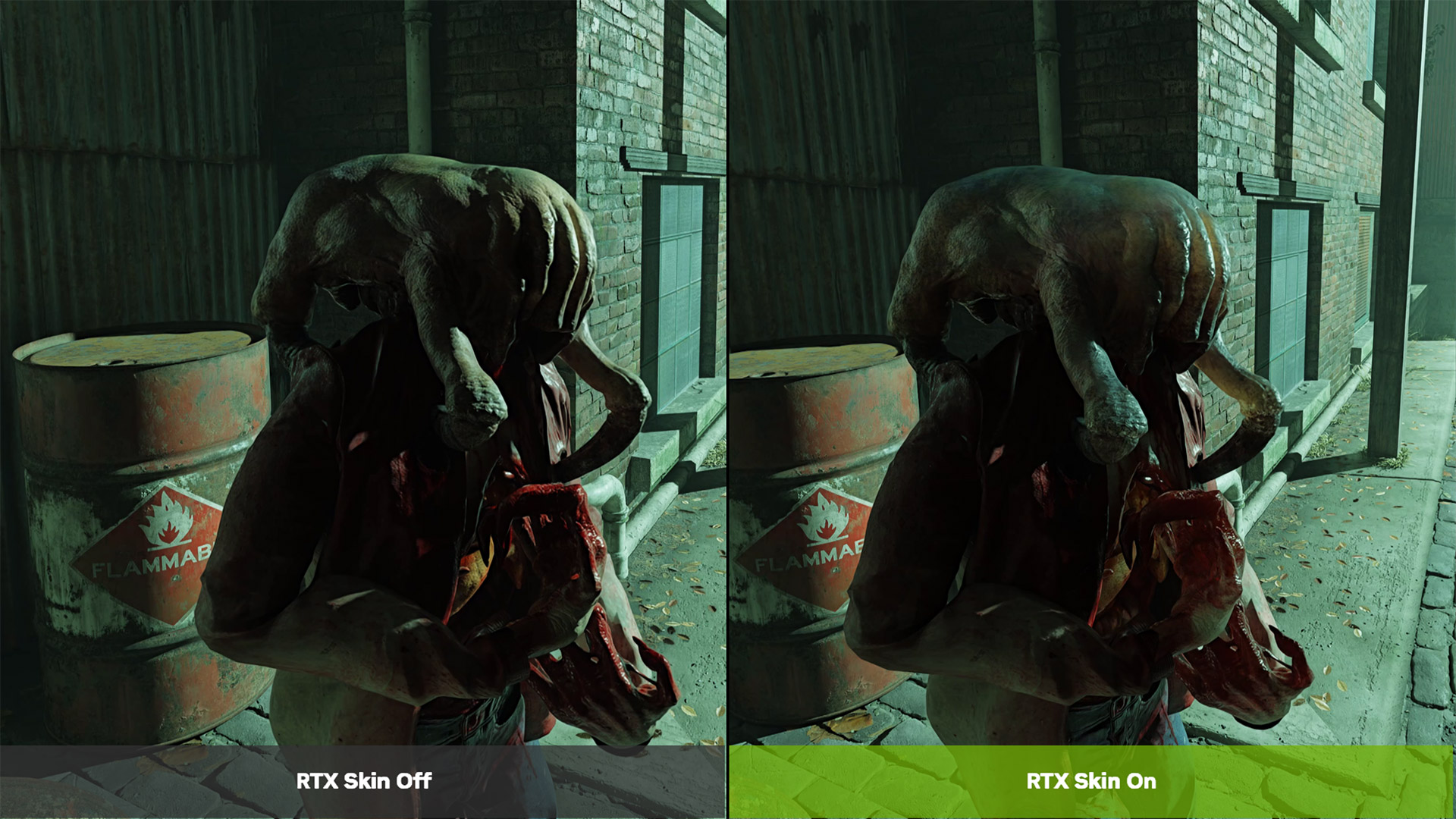
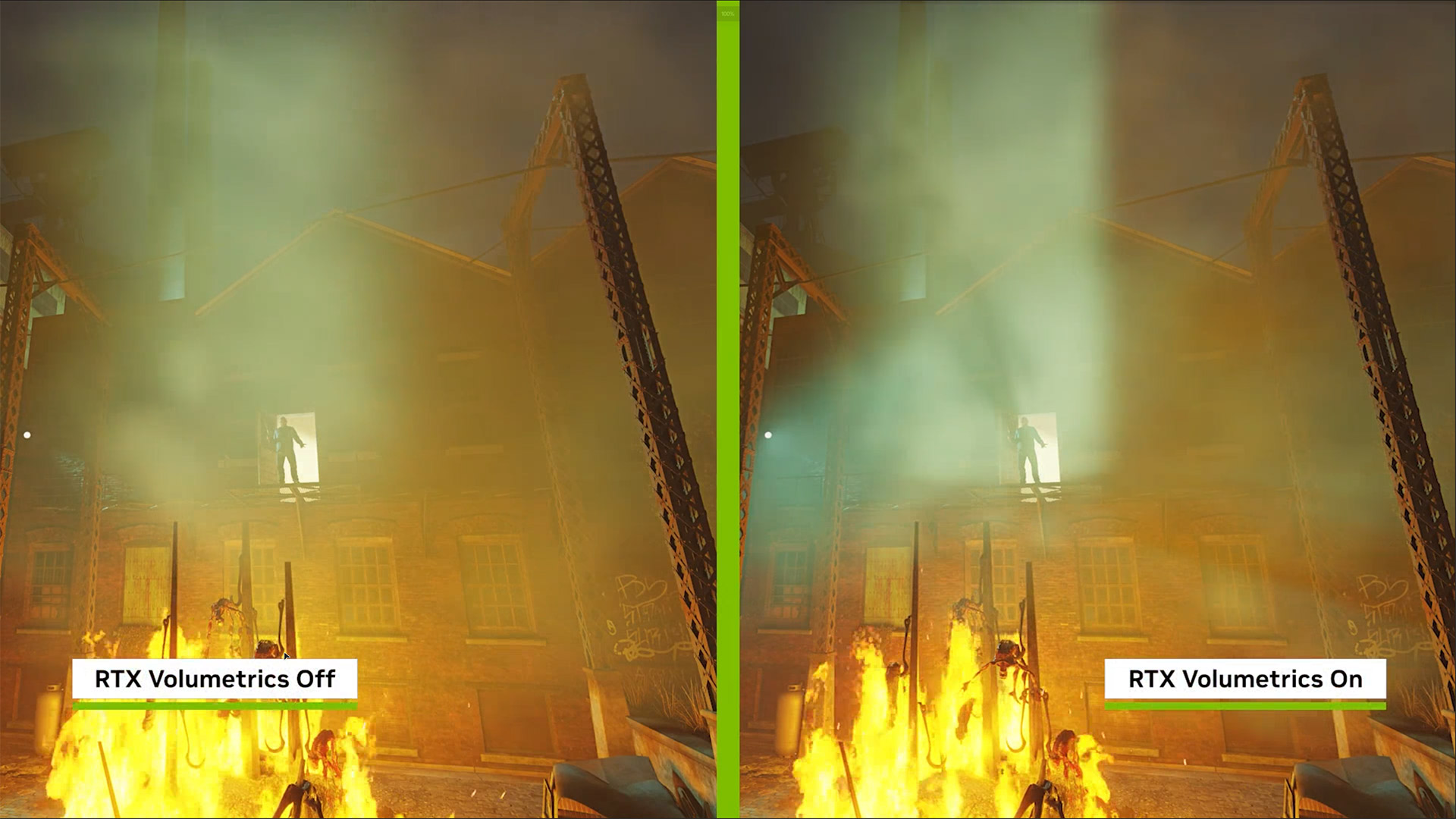
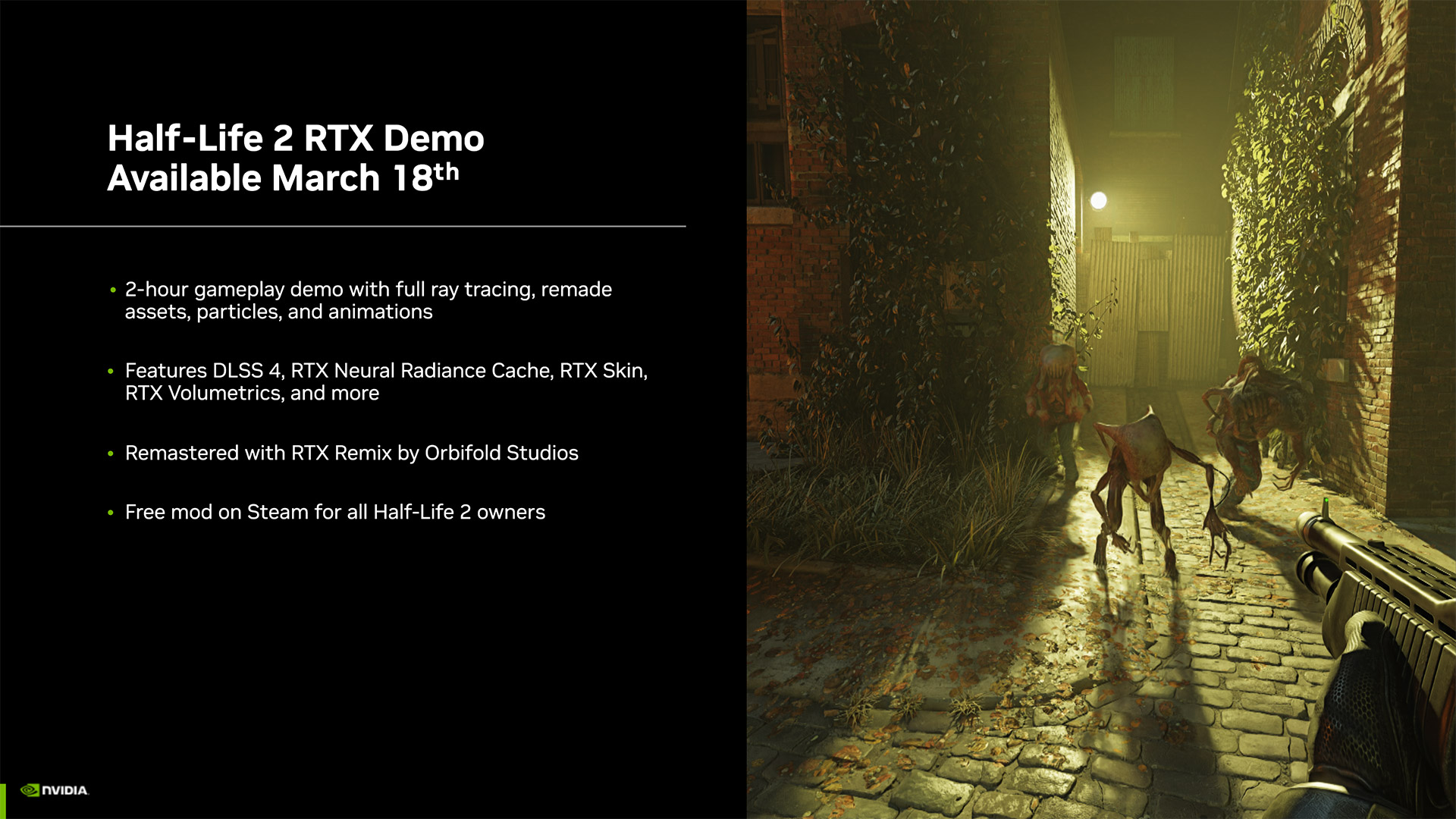
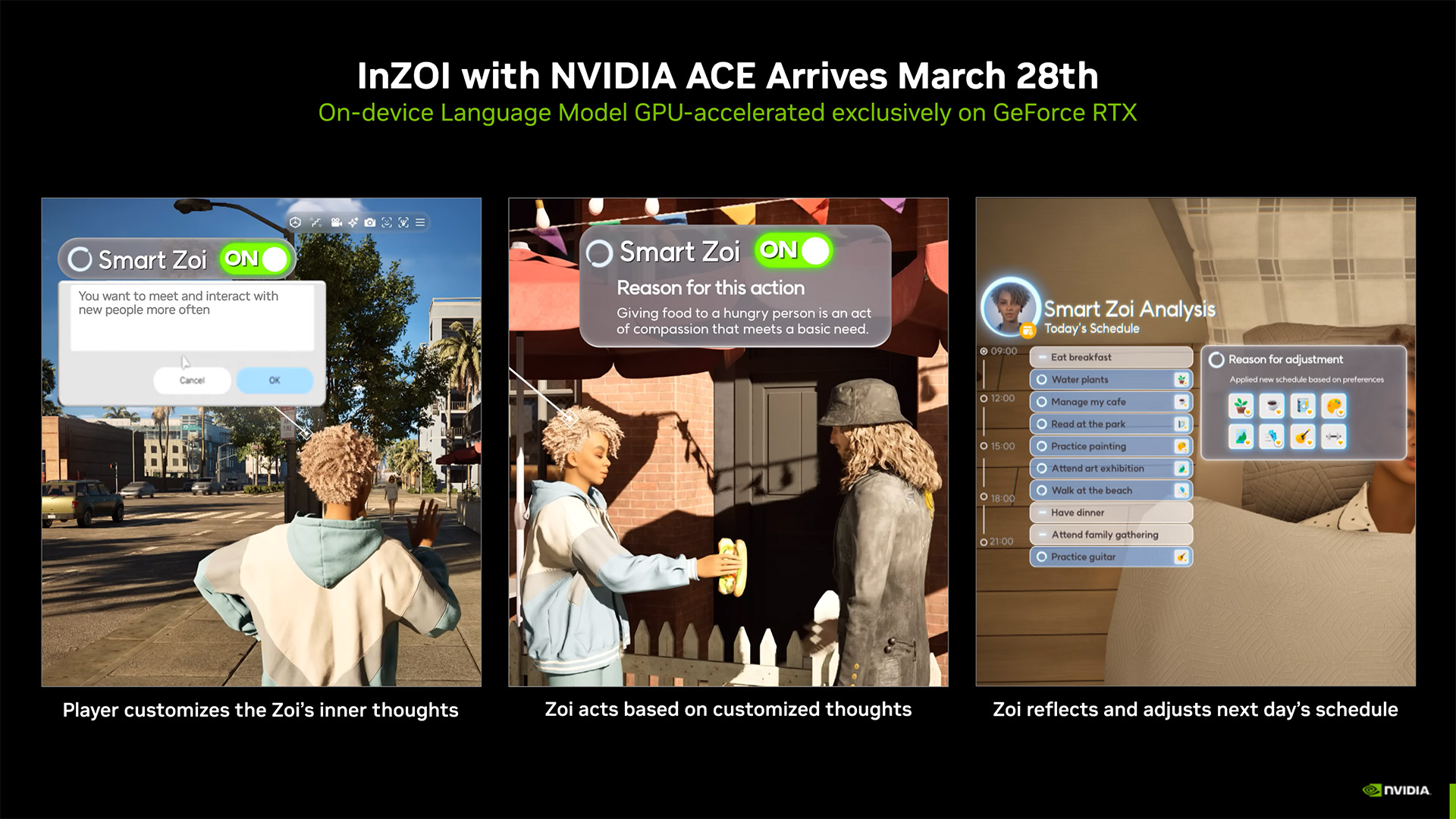
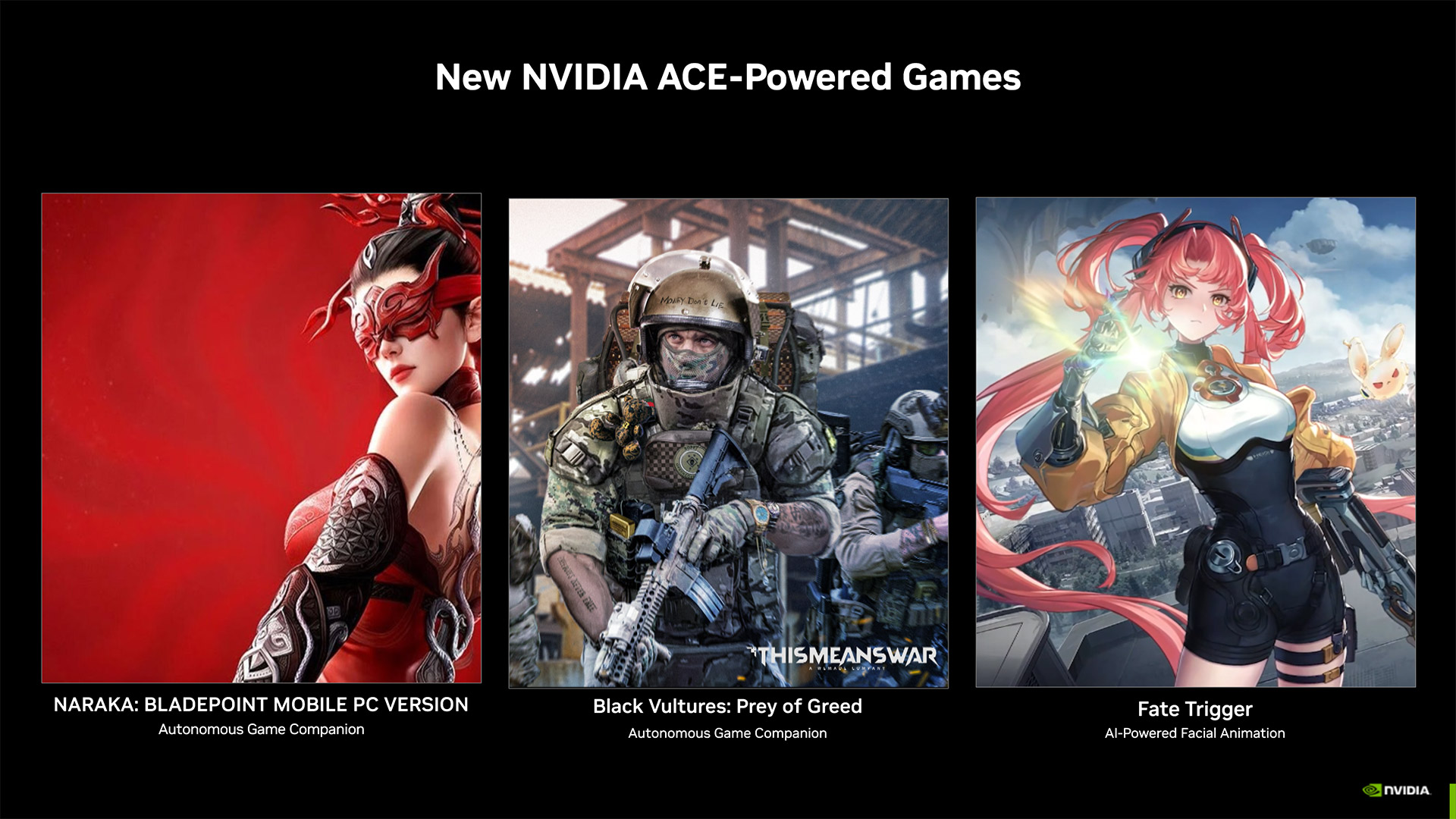
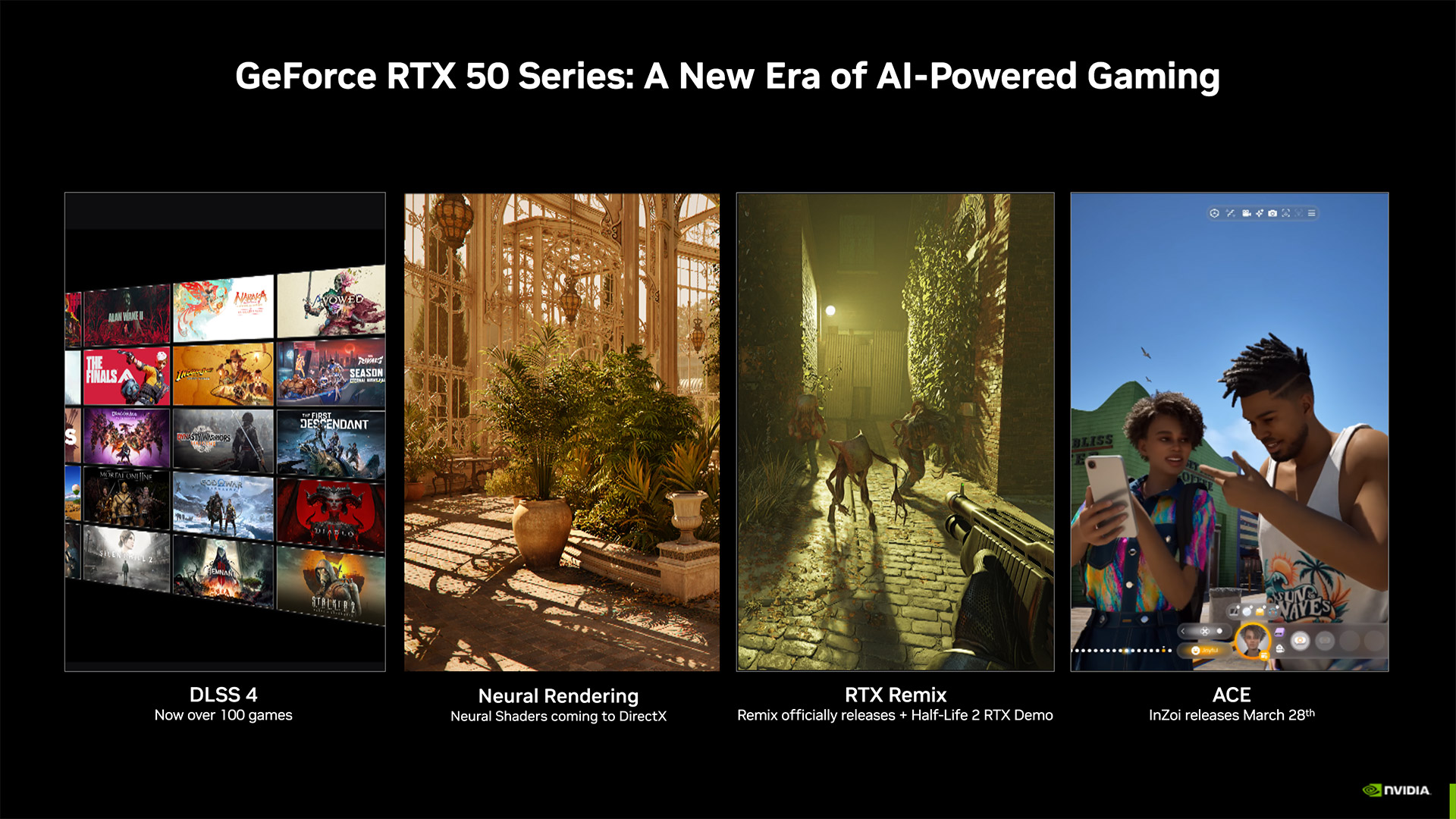
Besides making some misleading, at best, claims about Blackwell RTX availability, Nvidia also discussed the advances it's working with developers to enable DLSS 4 MFG and upscaling, Neural Shading, and ACE. RTX Remix officially left beta today as well, and there will be a public Half-Life 2 RTX demo available on March 18, offering vastly improved visuals compared to the original game that's now over 20 years old. [Ed: Where's my cane?]
You can see the rest of the announcements in the above slide deck. There's more marketing hype around the performance boost offered by DLSS 4 and Multi Frame Generation (MFG), which, as we discussed in our own in-depth testing, tends to be a highly inflated way of looking at performance. It's not that MFG is bad, per se, but even Nvidia's own numbers should cause some raised eyebrows. Like this performance result from Portal RTX:

Updates to the RTX Remix toolset combined with neural rendering features like the neural radiance cache deliver more than double the performance compared to the Remix beta. And then we look at the details.
Base RTX Remix beta performance was 125 FPS — that's with DLSS 3.5 and frame generation. Runtime optimizations and texture streaming account for a 22% increase, and there's another 18% improvement from the neural radiance cache. Together, those would result in performance of 175 FPS, an impressive 40% improvement. Then DLSS 4 MFG4X, on top of that, "increases" performance by 73%. But what it really does is drop the base non-framegen performance from ~88 FPS to ~76 FPS.
Either way, it's still running fast enough that the result should be very playable and look incredibly smooth, particularly if you have a 240 Hz 4K monitor. But that's also with an RTX 5090, which in our testing provides up to 60% higher performance than the RTX 5080 for demanding ray traced games, 75% higher performance than the RTX 5070 Ti, and 143% more performance than the RTX 5070.
By those metrics, 4K with performance upscaling and MFG4X on an RTX 5070 might only get around 125 FPS in Portal RTX on an RTX 5070, and it would feel more like 31 FPS in terms of input sampling and latency. That's still playable, but nowhere near what the MFG numbers might suggest in terms of user experience. 120 FPS via MFG isn't the same feel as a native 120 FPS, or even 120 FPS with regular framegen. And how will Half-Life 2 RTX run, given it's presumably an even more demanding game? We'll find out next week.
As we've noted in so many of our recent GPU reviews, the fundamental problem is supply and demand. The demand — and record $130 billion in revenue — for AI and data center GPUs and hardware dwarfs what Nvidia or any other company might make on consumer GPUs for gaming right now. Until that changes, we're not likely to see sufficient supply to meet demand for gaming GPUs, never mind finding GPUs available at their ostensible MSRPs.
One thing Nvidia didn't talk about yet is the widely rumored impending announcement of the RTX 5060 Ti and RTX 5060. Prices have started popping up online, and the full specs have been leaked multiple times. The TLDR: They're both 128-bit memory interfaces, and it looks like they'll launch with 8GB configurations, with an optional 16GB 5060 Ti as an upgraded solution. Prices and availability are still unknown factors.
Stay On the Cutting Edge: Get the Tom's Hardware Newsletter
Get Tom's Hardware's best news and in-depth reviews, straight to your inbox.
Jarred Walton is a senior editor at Tom's Hardware focusing on everything GPU. He has been working as a tech journalist since 2004, writing for AnandTech, Maximum PC, and PC Gamer. From the first S3 Virge '3D decelerators' to today's GPUs, Jarred keeps up with all the latest graphics trends and is the one to ask about game performance.
-
Jabberwocky79 "There are three kinds of lies: lies, damned lies, and statistics"Reply
@magbarn you just beat me to it LOL -
WonkoTheSaneUK So, Nvidia are claiming they only shipped (checks notes...) three 4090's in October 2022? 🙃Reply -
TheyStoppedit Replybaranlai said:Nvidia giving misleading information again? *pretends to be shocked*
You beat me to it.... and probably everyone else.... Lol. The moment I read the headline, I knew right away something wasn't right. This company has made an olympic sport out of lying/deception/misleading. Its like.... you cant believe anything they say anymore. The easiest way to tell when NVidia marketing team is lying: is when their lips are moving. Good grief. -
-Fran- Just leaving the obligatory "yeah, same reaction as the rest" post.Reply
I guess it's pathologic at this point for nVidia to do this? Maybe they need counceling? Some time off at a pet farm to enjoy themselves?
Regards. -
Bikki The 50 series is clearly a scam. Jensen put a huge bet on neural rendering. At this point 80% r&d have been relocated for tensor cores in b200 while the shader (rasterization) is sinking fast. But ai rendering is not here yet, and the result? a lack luster gaming gpu generation with sacred quantity and abysmal price tag to match (2000usd for 5090). The real loser in this bet of course is the poor and thirsty gamer.Reply -
Pierce2623 A 5070 is $750 but 3 months ago a 4070 with the SAME DAMN PERFORMANCE was $500 all day long. Nvidia and AMD both purposely dried the market out to create these conditions.Reply -
jlake3 Nvidia can cherry-pick the statistics all they want, but I don’t think that slide is going to make anyone standing in front of an empty shelf of $940 RTX 5070TIs feel more fondly towards them.Reply
We can see with our own eyes that the launch was bad and general sentiment towards the 50-series is bad. -
Jabberwocky79 Reply
Agree 100% on Nvidia deliberately drying out the market. I'm not so sure about AMD. I'm not an AMD fanboy by any means, but I don't recall having any trouble getting AMD cards until Nvidia's supply started drying up. Once that happened, prices and availability went haywire across the board.Pierce2623 said:A 5070 is $750 but 3 months ago a 4070 with the SAME DAMN PERFORMANCE was $500 all day long. Nvidia and AMD both purposely dried the market out to create these conditions.
